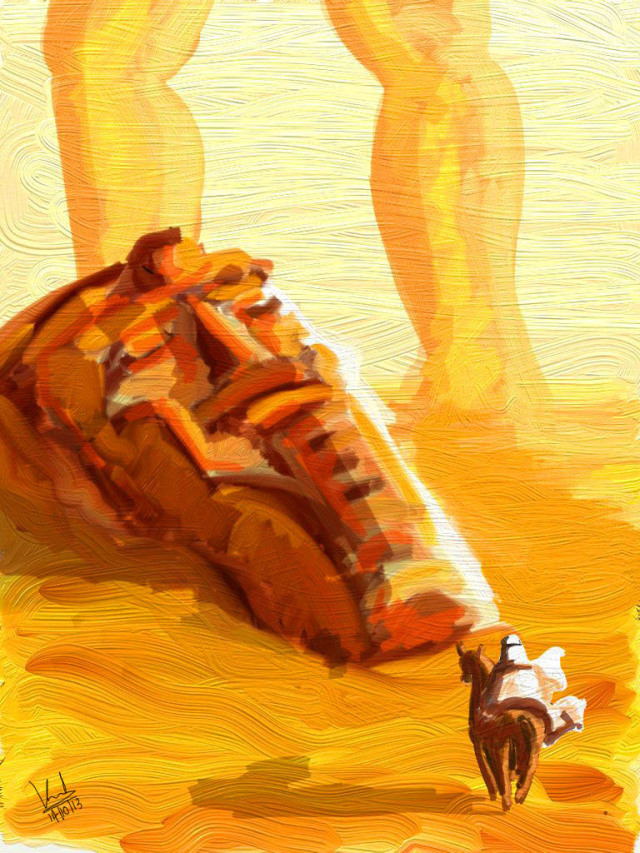


Near them, on the sand, Half sunk a shattered visage lies, whose frown, And wrinkled lip, and sneer of cold command, Tell that its sculptor well those passions read Which yet survive, stamped on these lifeless things, The hand that mocked them, and the heart that fed And on the pedestal, these words appear: My name is Ozymandias, King of Kings Look on my Works, ye Mighty, and despair! Nothing beside remains. I met a traveller from an antique land, Who said - “Two vast and trunkless legs of stone Stand in the desert. Shelley wrote the poem as part of a competition with his friend, Horace Smith. A sonnet about the remnants of a statue standing alone in a desert - a desert which was once the vast civilisation of Ozymandias, ‘King of Kings’ - the poem is a haunting meditation on the fall of civilisations and the futility of all human endeavour. Image: Ozymandias by alexzakil, on deviantart (Creative Commons).Published in “The Examiner” on 11 January 1818, ‘Ozymandias’ is perhaps Percy Bysshe Shelley’s most celebrated and best-known poem. He is the author of, among others, The Secret Library: A Book-Lovers’ Journey Through Curiosities of History and The Great War, The Waste Land and the Modernist Long Poem. The author of this article, Dr Oliver Tearle, is a literary critic and lecturer in English at Loughborough University. You can listen to a reading of ‘Ozymandias’, complete with an animated video, here.įor more close analysis of Romantic poetry, check out our analysis of Keats’s ‘On First Looking into Chapman’s Homer’ and Wordsworth’s classic daffodils poem. In the last analysis, Shelley’s ‘Ozymandias’ is a fine reminder that everything – even mighty empires – is doomed to fall to dust. Ozymandias’ empire may have gone, but the poem written in his name has endured. Not up to Shelley’s standard, perhaps – but not a bad effort. He meets some fragment huge, and stops to guess Where London stood, holding the Wolf in chace, Wonder like ours, when thro’ the wilderness ‘The wonders of my hand.’- The City’s gone,. ‘The King of Kings this mighty City shows ‘I am great OZYMANDIAS,’ saith the stone, Stands a gigantic Leg, which far off throws Smith’s poem doesn’t repay the same close analysis as Shelley’s ‘Ozymandias’, but it’s worth a read: Smith originally titled his poem ‘Ozymandias’, the same as Shelley’s, though he subsequently renamed it ‘On A Stupendous Leg of Granite, Discovered Standing by Itself in the Deserts of Egypt, with the Inscription Inserted Below’ – which is rather less catchy or memorable as titles go. (Smith’s effort was published in the same magazine a month after Shelley’s.) ‘Ozymandias’ is rightly celebrated and often anthologised and analysed, but what is less well-known is that Shelley wrote the poem in competition with his friend, Horace Smith. Shelley’s poem rhymes ababacdcedefef. The rhyme of ‘appear’ with ‘despair’ is a masterstroke: ‘despair’ also chimes with ‘appear’ by summoning that verb’s ghostly opposite, ‘disappear’ – exactly what has happened to Ozymandias’ vast empire, and decidedly apt given that ‘disappear’ itself doesn’t actually appear in the poem. In terms of its form, the poem is innovative and worthy of closer analysis: its fourteen lines and iambic metre mark it out as a sonnet, but its rhyme scheme is different from the traditional English or Italian sonnet. Shelley had no time for gods, or God, either: indeed, he had been expelled from the University of Oxford for writing a pamphlet titled The Necessity of Atheism, which shows how radical such a belief (or rather lack of belief) was held to be in early nineteenth-century Britain. The phrase ‘King of Kings’ is associated with the Christian God, or more specifically with Jesus Christ: in the New Testament, the phrase is used in reference to Christ in the First Epistle to Timothy (6:15) and the Book of Revelation (twice – see 17:14, 19:11–16). Or perhaps for ‘King of Kings’ we should think not a God-anointed king but God himself (as Egyptian pharaohs like Rameses II were thought to be gods on earth).


 0 kommentar(er)
0 kommentar(er)
